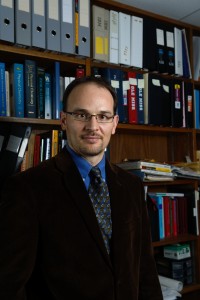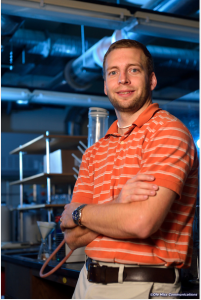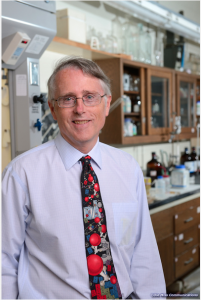Matt Dukes, a graduate student in the Department of Chemistry and Biochemistry at the University of Mississippi, was recently awarded a Graduate Achievement Award. This award is only given to 6 graduate students in the College of Liberal Arts each year.
Archive for the ‘News’ Category
Prof. Godfrey Honored With Multiple Awards
Dr. Murrell Godfrey is the recent recipient of two awards. On Feb. 18 he received the “Black History Month Diversity Award for Excellence” from the Mississippi Board of Trustees of State Institutions of Higher Learning. He also received the 2016 “Kenneth S. Field Award of Appreciation for Outstanding Service to the American Academy of Forensic Science Staff.” 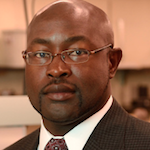
Greg Tschumper Honored with Faculty Achievement Award
Greg Tschumper, professor of chemistry and biochemistry at the University of Mississippi, is the 2015 recipient of the university’s Faculty Achievement Award.
Since receiving his doctorate 16 years ago from the University of Georgia, Tschumper has been a significant contributor to the Department of Chemistry and Biochemistry and the entire university. As a teacher, he has the reputation of being extremely challenging and highly effective.
Tschumper said one of the things that motivates him is the respect he has for his colleagues.
“It is very humbling when you look at previous recipients of this award, and I certainly do not feel like my name belongs on that list,” Tschumper said. “This award says more about the amazing environment in which I have the privilege of working than it does about me.”
Tschumper said he is passionate about research and teaching, and considers himself fortunate to be at a university that places a high value on both.
“Every day I get to interact with outstanding students, not only in the classroom but also in the research lab,” he said. “All of my research at Ole Miss has been accomplished with the help of the bright minds and hard work of our graduate and undergraduate students. Any success I’ve had as a teacher or a scholar stems from the talented people around me and being in an atmosphere that fosters the growth of that talent.”
The Burlington Northern Award was established in 1985 to honor superior teaching faculty who were also active researchers. This award evolved into the Faculty Achievement Award, which is given annually to recognize unusual effort in the classroom, involvement with students, active scholarship and service to the university.
One student wrote of Tschumper’s courses: “His teaching style relies on self-study quite a bit. You’ll have to work for this class, for he is determined to make his students the best chem students on this campus.”
Another evaluation letter stated that he is “probably one of the most challenging professors on this campus, but he is always willing to work with you to get better.”
Tschumper joined the chemistry and biochemistry department in 2001 after working as a postdoctoral fellow at ETH Zürich in Switzerland and at Emory University. He has also provided service to the university, including his contributions on the University Research Board and the Faculty Senate.
In the area of scholarship, Tschumper’s achievements are remarkable, and he has established himself as an expert in physical chemistry, theoretical chemistry, computational chemistry, non-covalent interactions, hydrogen bonding and van der Waals forces. He has published an average of four-plus peer-reviewed journal articles per year since joining the UM faculty. Tschumper has also received more than $3 million in federal grants for research and student support.
Tschumper’s other professional honors and awards include the 2009 Cora Lee Graham Award for Outstanding Teaching of Freshmen. He has served as the Computational Chemistry Research Focus Group Leader on an EPSCoR award from the National Science Foundation that has brought in more than $20 million to the state of Mississippi for research and STEM education.
Tschumper is also the principal investigator on a major research instrumentation award from the NSF for a GPU supercomputer housed at the Mississippi Center for Supercomputing Research on campus.
He is the father of two daughters, Kate and Anne Paige.
Click here for the official Ole Miss news story by Edwin Smith
Jared Delcamp Wins Prestigious CAREER Award
Jared Delcamp, an assistant professor of chemistry and biochemistry, has won a prestigious $523,000 National Science Foundation CAREER Award for his research on converting solar energy to electricity.
Delcamp was recognized for his educational development plan, particularly his efforts to increase interest in STEM education among students of all majors and among high school students from Mississippi’s economically underprivileged regions. He was also recognized for his group’s research on converting solar energy to electricity through an affordable technology using dye-sensitized solar cells. He said the funding will greatly enhance that work.
“Personally, I have been blown away by the support shown to our research program and STEM recruiting efforts in the department and now by NSF,” Delcamp said. “I’m beyond overjoyed to have been awarded such a tremendous acknowledgement in my second year at Ole Miss, and I look forward to continuing our efforts to make the world a better place.”
The National Science Foundation is an independent federal agency that Congress created in 1950 to “to promote the progress of science; to advance the national health, prosperity and welfare; to secure the national defense.” The NSF has a $7.3 billion annual budget, which funds about 24 percent of all federally supported basic research at U.S. colleges and universities.
“The NSF CAREER Award is the most sought-after recognition for any new science faculty member,” said Rich Forgette, interim dean of the UM College of Liberal Arts. “It is very competitive to receive a CAREER award, and our chemistry faculty members’ success i
ndicates the quality of their research.”
Nathan Hammer and Amala Dass, two UM associate professors of chemistry and biochemistry, have previously been awarded NSF CAREER awards. The three awards for the department are a testament to the quality its faculty, said Charles Hussey, chair and professor of chemistry and biochemistry.
“This speaks to the quality of our younger faculty,” Hussey said. “We are fortunate that he has chosen the University of Mississippi for his career.”
Hussey said it’s no surprise the NSF honored Delcamp, whom he calls an “outstanding researcher and a dedicated student-centered instructor.”
“He has academic training from some of the best institutions in the world,” Hussey said. “He received this grant because he has many new ideas about organic materials for the conversion of solar energy that may revolutionize the field.”
See https://news.olemiss.edu/um-professor-wins-prestigious-career-award/ for the original Ole Miss news article.
Daniell Mattern Chosen for Coulter Professorship
Prof. Daniell Mattern, a renowned organic synthetic chemist in the Department of Chemistry and Biochemistry, is the newest recipient of the Margaret McLean Coulter Professorship at the University of Mississippi.
Daniell Mattern is the fourth UM faculty member to be awarded the endowed position, which was established in 1983 through a bequest in the will of the late Victor Aldine Coulter, for whom Coulter Hall is named. Coulter served as dean of the College of Liberal Arts from 1936 to 1957 and was a professor of chemistry.
“I was stunned,” Mattern said after receiving the news from his department chair. “I thought perhaps he was joking, but he assured me he was not. The previous holders have been so impressive; it did not cross my mind that this was in the cards.”
The Coulter Professorship recognizes a professor in the department who has excelled in teaching and research. The award includes the honorific title “Margaret McLean Coulter Professor” and includes a yearly stipend that can be used as a salary supplement or for research support and travel.
Mattern was chosen for this distinction as a result of his outstanding achievements in research about organic electronic materials and his unparalleled success in teaching a difficult branch of chemistry to a myriad of UM students. Previous recipients include the late Charles A. Panetta, retired professor Jon F. Parcher and associate provost Maurice R. Eftink.
“It is rare to find anyone who has graduated from our university and pursued a career in the health professions, such as pharmacy, medicine or dentistry, who has not been touched in some way by Dr. Mattern,” said Charles Hussey, chair and professor of chemistry and biochemistry. “He is well known for his engaging teaching style in which he makes a game out of learning organic chemistry. Students quickly forget that they are studying a subject which had seemed so formidable to them in the beginning.”
Mattern joined the UM faculty in 1980, when Coulter Hall was just a few years old.
“Victor Coulter was alive at the time, although I never met him,” he said. “The position offered a good blend of teaching and research opportunities, and I have been able to keep engaged with both of those facets of being a professor for my 35 years here.”
Mattern was promoted to professor in 2004 and is a founding member of the UM chapter of Phi Beta Kappa. He has a long record of instructional excellence, having received the UM Elsie M. Hood Outstanding Teacher of the Year in 1992. He was recognized as College of Liberal Arts Teacher of the Year in 1998.
“The Coulter Professorship is the first recognition I have received that speaks to the full spectrum of a professor’s responsibilities: research, teaching and service,” Mattern said.
The honoree has published extensively about the synthetic routes to organic molecular rectifiers, (such as electronic components that are composed of certain arrangements of organic chemical compounds instead the usual silicon-based electronic materials). Mattern’s research has been supported by the National Science Foundation.
“Making a particular molecule a tiny bit smaller, solely by putting deuteriums in place of its hydrogens, has to be among the most personally fulfilling among my research achievements,” Mattern said. “I’d been fascinated with this concept as a graduate student and saw a way to demonstrate it by modifying a molecule we were using in another study. So this little side project satisfied a longtime quest for me.”
Equally gratifying for Mattern was a service task he took upon himself when he was on the Undergraduate Council: a complete revision of the undergraduate catalog.
“It had been assembled piecemeal over the decades and had accumulated a great deal of conflicting, awkward and obsolete passages,” he said. “I found it hard to use as a council member, and I’m sure students found it difficult, too. It took a couple of years, but we got every section reworked and approved.”
When it comes to instruction, Mattern said probably the most fun he has in teaching organic chemistry is on the last day of class.
“We have a course review in the form of a quiz show,” he said. “Teams of students try to answer questions to expose the ‘hidden reaction’ so they can ‘name that product.’ I wear a tux, and we give away goofy prizes to the winners.”
Mattern received a bachelor’s degree from Kalamazoo College in Michigan and his master’s and doctoral degrees from Stanford University. He did postdoctoral research at Tufts University Medical School in Boston and the University of California at San Diego before joining UM as an assistant professor in 1980. Mattern teaches undergraduate and graduate courses in organic chemistry.
He is married to Elaine Gelbard, a dance teacher and arts educator. They have two adult daughters, Sierra and Jillian.
Mattern has been a cellist for 50 years and plays with the North Mississippi Symphony Orchestra. An author, he has written a few Ten-Minutes Plays that have been produced by Theatre Oxford. Mattern also enjoys hiking in mountains and riding his bike around campus.
See https://news.olemiss.edu/daniell-mattern-chosen-coulter-professorship/ for the original Ole Miss news story by Edwin Smith.
Prof. Watkins Receives Ralph E. Powe Junior Faculty Enhancement Award
First-year assistant professor Davita Watkins has been awarded the Ralph E. Powe Junior Faculty Enhancement Award by Oak Ridge Associated Universities (ORAU). ORAU invests in the careers of junior faculty at member institutes by providing seed funding via this awards program. This competitive research award annually recognizes faculty members of various disciplines in science and technology. Recipients, each of whom are in the first two years of a tenure track position, receive $5,000 from ORAU with an additional $5,000 institutional match. Prof. Watkins was awarded the Powe Award to examine non-covalent interactions between organic semiconducting molecules to increase their efficiency in devices used as alternative forms of energy.
Charles Hussey Named 2015 UM Distinguished Researcher
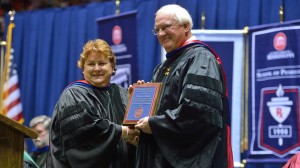
Charles Hussey accepts the University of Mississippi’s Distinguished Research Creative Achievement Award. Photo by Kevin Bain/Ole Miss Communications.
Whether or not it’s true that good things comes in threes, that’s certainly been the case for Charles L. Hussey, who received the University of Mississippi’s 2015 Distinguished Research and Creative Achievement Award on Saturday (May 9).
The UM chair and professor of chemistry and biochemistry was presented the prestigious honor, which includes $7,500 and a personal plaque, during the university’s annual Commencement ceremonies in Tad Smith Coliseum. Hussey also received the Electrochemical Society’s Max Bredig Award in Molten Salt and Ionic Liquid Chemistry last October and the Southeastern Conference’s Faculty Achievement Award in April.
“I think this is the most important of the three because it recognizes a lifetime of scientific achievement at UM resulting from hard work, sacrifice, as well as a bit of good luck,” Hussey said upon learning of his third accolade this academic year. “There are many deserving researchers/scholars on this campus, and I was very fortunate and humbled to be chosen from this pool of very accomplished people.
“I have been very privileged to work with a number of outstanding colleagues across the U.S. and Europe, as well as great doctoral and postdoctoral students. And most importantly, I have a very tolerant family who put up with my extra hours at work, many business trips and military reserve duty, too.
Alice Clark, UM vice chancellor for research and sponsored programs, said Hussey is most deserving of the award.
“In Dr. Hussy’s prolific career, he has produced more than 150 peer-reviewed publications, including several that have been cited more than 100 times and a seminal article leading to the birth of ionic liquids that has been cited more than 1,500 times,” Clark said. “He has an impressive track record of extramural competitive funding and his lab was recognized recently by R&D Magazine for developing a novel aluminum plating system that was considered to be one of the 100 most technologically significant products in 2014.
“His many accomplishments demonstrate his leadership in the field, his scientific creativity and his instinct for innovative thinking.”
Hussey, who holds a doctorate in chemistry from UM, joined the faculty in 1978 after serving a four-year active duty term as a military scientist at the U.S. Air Force Academy’s Frank J. Seiler Research Lab. For more than 30 years, he has researched the electrochemistry and transport properties of ionic liquids and molten salts, an outgrowth of the work he began at the Seiler Lab.
He has authored or co-authored more than 140 refereed journal articles, book chapters, patents and government technical reports. His work has been supported by the National Science Foundation, Air Force Office of Scientific Research, Alcoa, U.S. Department of Energy and U.S. Department of Defense. He is technical editor of the Electrochemical Society journals.
“Dr. Hussey’s research record is truly impressive, and he is a model for other faculty in the college,” said Rich Forgette, interim dean of the College of Liberal Arts and professor of political science. “Chuck is a leader in his field of electrochemistry, and our chemistry department has flourished under his leadership.”
Hussey said he already has plans for how he will spend funds that come with his award.
“My three grandchildren, Olivia, Charles and Maddie, have requested another trip to Disney World,” he said. “This trip should take care of the stipend money.”
Created in 2008, the annual honor recognizes a faculty member who has shown outstanding accomplishment in research, scholarship and/or creative activity. Much like Hall of Fame inductions, recipients can receive the honor only once. Nominees must be an associate or full professor (including research associate professors or research professors who are not tenure-track faculty) and must have been continuously employed full-time by the university for at least five years.
Past honorees include Sam Shu-Yi Wang, F.A.P. Barnard Distinguished Professor Emeritus of Mechanical Engineering; Larry Walker, director of the National Center for National Products Research; Charles Reagan Wilson, the Kelly Gene Cook Chair of History and professor emeritus of Southern studies, Dale Flesher, Arthur Anderson Lecturer in the Patterson School of Accountancy; Atef Elsherbeni, professor of electrical engineering and associate dean of research and graduate programs in the UM School of Engineering; and Robert Van Ness, Bruce Moore Scholar of Finance and director of the Doctor of Finance program.
Prof. Hussey Wins 2015 SEC Faculty Achievement Award
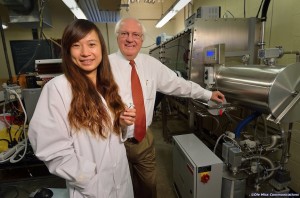
Charles Hussey, UM chair and professor of chemistry and biochemistry, (right) was awarded a 2015 SEC Faculty Achievement Award.
The winners of the 2015 Southeastern Conference Faculty Achievement Awards were announced by the league office on Wednesday. These annual awards honor one faculty member from each SEC university who has excelled in teaching, research and scholarship. Prof. Hussey was recognized as the University of Mississippi’s recipient.
Each award winner will become his or her university’s nominee for the 2015 SEC Professor of the Year Award and will receive a $5,000 honorarium from the SEC. The SEC Professor of the Year, to be named later this month, receives an additional $15,000 honorarium and will be recognized at the SEC Awards Dinner in May and the SEC Symposium in September.
“The SEC Faculty Achievement Awards give us a unique opportunity to not only showcase the work of our outstanding faculty members, but to also support their future research and scholarship,” said Nicholas Zeppos, Chancellor of Vanderbilt University and President of the Southeastern Conference. “These 14 men and women are some of the most accomplished and influential leaders in their disciplines, and I offer each of them my sincerest congratulations.”
To be eligible for the SEC Faculty Achievement Award, a professor must be a teacher or scholar at an SEC university; have achieved the rank of full professor at an SEC university; have a record of extraordinary teaching; and a record of scholarship that is recognized nationally and/or internationally.
SEC Commissioner Mike Slive said, “This year’s SEC Faculty Achievement Award recipients are to be commended for their unwavering dedication to higher education. The SEC is pleased to recognize 14 individuals who have made such a positive impact on our students.”
The SEC Faculty Achievement Awards and the SEC Professor of the Year Award are both selected by SEC Provosts, and the program is administered by SECU, the academic initiative of the Southeastern Conference. SECU serves as the primary mechanism through which the collaborative academic endeavors and achievements of SEC students and faculty are promoted and advanced.
Chemistry Department Modifies BS Degree to add Biochemistry Emphasis
The Department of Chemistry and Biochemistry at the University of Mississippi has begun offering two different pathways for students seeking a bachelor’s degree in chemistry. Click here for the full UM press release.
“Our B.S. in Chemistry degree has been modified to have two tracks for students to choose from,” said Nathan Hammer, associate professor of chemistry and biochemistry. “The first option is a traditional chemistry track that prepares students well for graduate school in chemistry or a career in the chemical industry. The second track has a biochemistry emphasis and is specifically designed for students who wish to go on to medical school or graduate school in biochemistry.”
The department has a suggested four-year course outline with electives that count toward the degree and are required for medical school admissions. These requirements are covered by the Medical College Admission Test, or MCAT. The modified
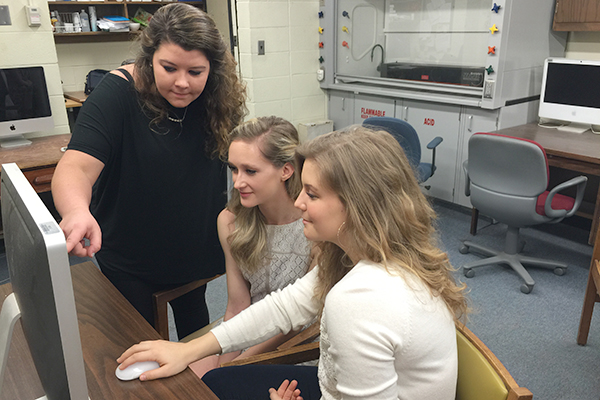
UM BS Chemistry majors (from left) Ashley Williams, Sarah Sutton and Katelyn Allen conduct undergraduate research.
degree went into effect this spring.
“Both tracks are certified by the American Chemical Society and are among the most rigorous in the country,” Hammer said.
By modifying its B.S. in Chemistry degree, the department better serves the growing number of pre-med students who wanted a rigorous bachelor’s degree in the physical sciences, he said. These students typically enjoy chemistry, physics and math, but eventually wish to serve others in a medical profession.
“Prior to modifying our B.S. degree, these students had two options,” Hammer said. “The first was to satisfy our previous B.S. (in) Chemistry degree requirements and then take additional biology and biochemistry classes. The second option was to pursue our B.A. (in) Biochemistry degree and supplement it with calculus-based physics, additional advanced math courses and additional advanced chemistry courses.”
Most students opted to pursue the B.S. degree and take additional biochemistry and biology courses. Creating a B.S. in Chemistry degree track incorporates these additional biochemistry courses as well an advanced biology elective.
“We have substituted these courses for other chemistry courses that are useful for a career in chemistry, but not helpful in preparing for the medical profession,” Hammer said. “We have essentially taken what our best and brightest pre-med students have been doing on their own the last few years and crafted a degree that serves them. We have approximately 20 students total that are pursuing the new B.S. (in) Chemistry degree with the biochemistry emphasis. Most of these are pre-med students associated with the Sally McDonnell Barksdale Honors College.”
As a result of the additional students pursuing a B.S. degree each year, more space is needed for physical chemistry and inorganic chemistry laboratories. Coulter Hall’s new research annex includes a state-of-the-art molecular spectroscopy research lab that will serve CHEM 337 classes. CHEM 402 will be moved to a larger room that will be able to serve the larger number of students each year.
Since students in the new emphasis will be receiving a well-rounded chemistry degree, they will be taking courses in every area of chemistry and will have opportunities to take classes from almost every faculty member in the department, Hammer said.
“In their freshman year, they will take two semesters of general chemistry from Greg Tschumper, Steve Davis, Maurice Eftink, Jason Ritchie, Kerri Scott, Murrell Godfrey, John Wiginton, Jim O’Neal or Gerald Rowland,” Hammer said. “Students will take two semesters of organic chemistry in their sophomore year from Dan Mattern, Jared Delcamp or Davita Watkins.”
They will also take a number of advanced classes, including physical chemistry from Hammer, analytical chemistry from Amal Dass and Jim Cizdziel, biochemistry from Susan Pedigo, Randy Wadkins and Mike Mossing, and inorganic chemistry from Ritchie, Jonah Jurss and Walt Cleland.
“Students will also be required to perform original research with a faculty member in chemistry during their senior year, which could be with any research active faculty member,” Hammer said. “For this reason, this new degree track is especially popular with pre-med honors students who can get senior research credit for their honors thesis.”
Charles Hussey, chair and professor of chemistry and biochemistry, is enthusiastic about having two undergraduate degrees within the department.
“The new Bachelor of Science degree with emphasis in biochemistry is more versatile than our existing Bachelor of Arts degree in biochemistry,” he said. “It not only prepares students to compete for postgraduate opportunities in the pre-health professions, but also provides them with a solid foundation in advanced chemistry. With this foundation, they are well equipped for graduate studies in biochemistry as well as the research-based M.D.-Ph.D. programs offered by elite medical schools.”
For more information about the Department of Chemistry and Biochemistry, visit http://chemistry.olemiss.edu or call 662-915-7301.
Ole Miss Chemistry Graduate Joins Oldest Law Enforcement Agency in Texas
Ole Miss Forensic Chemistry graduate Melissa McFeeters (Class of 2013) recently accepted a position as chemist at the Brazoria County Sheriff’s Department in Texas. Melissa will work in controlled substances and toxicology. The Brazoria County Sheriff’s Department is the oldest law enforcement agency in Texas. The area was initially colonized by Stephen F. Austin and 300 Settlers in 1821. The first sheriff was elected in 1836 and commanded a Calvary company during the battle of San Jacinto. Brazoria is a rural county located south of Houston and just west of Galveston.
